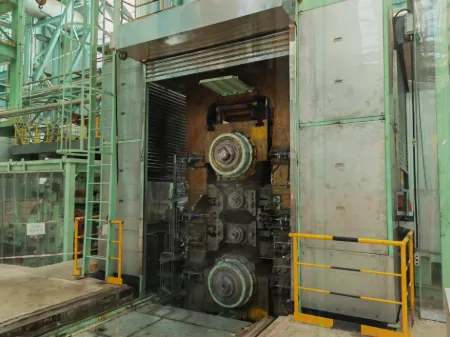
Selecting the Right Skin Pass Mill for Galvanized and Aluminized Coils
The selection of an appropriate skin pass mill represents a crucial decision for processors handling galvanized and aluminized coils, where surface quality and mechanical properties demand exceptional precision. Unlike conventional rolling operations, skin pass rolling serves as the final refining process that imparts the exact surface characteristics and mechanical enhancements required for premium coated steel products. This specialized light cold rolling operation typically applies just 0.5% to 3% reduction while dramatically improving the material's surface texture, flatness, and forming characteristics.

Modern skin pass rolling process technology has evolved to address the unique challenges presented by coated steel products, where preserving the integrity of zinc or aluminum coatings while achieving desired mechanical properties requires carefully calibrated equipment. The interaction between the mill's work rolls and the delicate coated surfaces necessitates sophisticated control systems that can maintain consistent pressure without damaging the protective layers. Contemporary solutions incorporate advanced automatic position control rolling mill technology and automatic tension control rolling mill systems to achieve this delicate balance, ensuring optimal results across various coating types and thicknesses.
Key Considerations for Galvanized and Aluminized Coil Processing
When evaluating skin pass mill options for coated coil processing, several critical factors emerge that directly influence final product quality. The mill must accommodate the softer nature of coated materials compared to uncoated steel, requiring precise control over rolling forces to prevent coating damage while still achieving the desired surface finish and mechanical properties. This becomes particularly important when processing differentially coated materials or products with special surface treatments that demand uniform compression across the entire strip width.
The skin pass rolling operation for coated coils must address two competing priorities simultaneously - improving the material's mechanical properties through controlled strain hardening while maintaining the coating's protective qualities and visual appearance. Modern mills achieve this through sophisticated control algorithms that regulate roll force, tension, and speed with micron-level precision. Integration with downstream automatic packaging machine systems further ensures that the carefully achieved surface quality remains protected throughout handling and transportation.
Skin Pass Mill Configuration and Technological Features
The architecture of a skin pass mill designed for coated products incorporates several specialized features to handle the unique requirements of galvanized and aluminized coils. A four-high mill configuration typically proves most effective, allowing for better control of roll deflection and more uniform pressure distribution across the strip width. The automatic position control rolling mill systems in these installations must provide exceptional responsiveness to accommodate variations in coating thickness and composition that might affect rolling dynamics.
Advanced skin pass rolling process controls now incorporate adaptive learning capabilities that automatically adjust parameters based on real-time feedback from the rolling operation. These intelligent systems can detect subtle variations in material behavior and make micro-adjustments to maintain consistent quality, particularly valuable when processing coils with varying coating weights or different metallic coatings. The integration between the automatic tension control rolling mill systems and the main rolling controls ensures uniform elongation and optimal flatness throughout the processing operation.
Surface Quality and Coating Preservation of Skin Pass Mill
The interaction between work rolls and coated surfaces during skin pass rolling requires careful consideration to achieve desired surface textures without compromising coating integrity. Modern mills employ specially engineered work roll surfaces and advanced roll cooling systems to prevent material pickup while transferring the precise surface pattern required by end-use applications. This becomes particularly critical when processing aluminized coils, where the aluminum-silicon coating presents different friction characteristics compared to galvanized coatings.
The skin pass rolling process for coated materials must carefully balance the degree of work hardening with coating preservation objectives. Too much reduction can lead to micro-cracking in the coating layer, while insufficient reduction may fail to eliminate yield point elongation and result in stretcher strain during subsequent forming operations. Contemporary mills address this through sophisticated closed-loop control systems that monitor both mechanical properties and surface characteristics in real time, making automatic adjustments to maintain optimal processing conditions.
Automation and Process Integration of Skin Pass Mill
Modern skin pass mill installations for coated coil processing incorporate comprehensive automation systems that extend far beyond basic rolling functions. The mill's automatic position control rolling mill systems work in concert with advanced tension control to maintain perfect synchronization throughout the processing line. This integration becomes particularly important when handling thinner gauges or sensitive coated products where improper tension could lead to coating damage or shape defects.
The complete processing line typically includes sophisticated automatic packaging machine systems that handle the finished coils with care to preserve the surface quality achieved during skin passing. These packaging systems often incorporate automatic surface inspection capabilities that verify product quality before final wrapping and labeling. The seamless integration between the skin pass mill, auxiliary equipment, and packaging systems creates a continuous, highly efficient processing line optimized for coated coil production.
-
YWLX’s 1450mm Six-Hi Reversing Mill Goes Live in BangladeshNewsNov.24,2025
-
Adjusting Roll Gap in 6Hi Reversing Cold Rolling Mill for Thin StripNewsNov.13,2025
-
Quality Control Standards for Automatic Gauge Control in Strip RollingNewsNov.13,2025
-
Effect of Skin Pass Rolling on Metal DuctilityNewsNov.13,2025
-
Key Components of a Modern TempermillNewsNov.13,2025
-
Common Wear Patterns of Work Roll in Tandem Cold Mill OperationsNewsNov.13,2025
-
Revolutionary Skin Pass Rolling Technology for Enhanced Steel QualityNewsNov.04,2025










